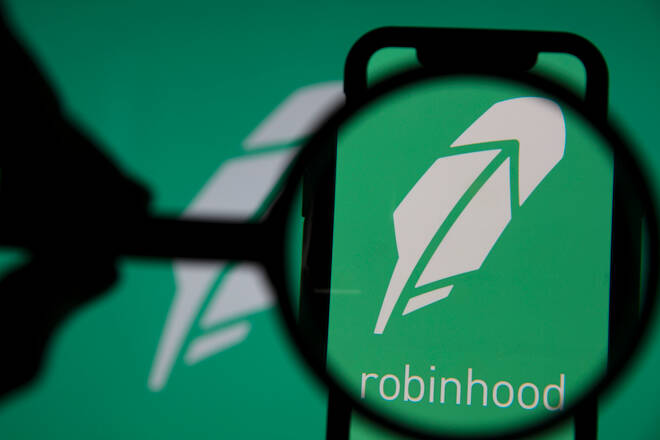Advertisement
Advertisement
Could The Fallout From The Robinhood Saga Push More Investors Towards IPOs?
By:
Robinhood, a financial services company founded in 2013 for the purpose of democratising the financial system, is planning to file confidentiality for an initial public offering (IPO) this month. The company will either pursue a direct listing or seek a special purpose acquisition company (SPAC) in order to create a new infusion of capital and allow for easier access to future financing.
The no-fee trading app for millennials, which is valued at $11.7bn, has been in talks with underwriters about filing confidential IPO paperwork with the U.S Securities and Exchange Commission.
Rumours circulated that Robinhood had hired Goldman Sachs to do its IPO last year but this is yet to be confirmed. The company is hoping to convert some of its financing into equity, a first tranche will convert at a $30bn valuation or a 30% discount to the IPO.
According to reports, the company has also considered selling shares in its IPO directly to its own users. That could be a possible olive branch as retail investors usually do not get to buy into new listings at the offering price. Instead, they have to invest on the first day of trading in a rush that can drive up the stock price.
Robinhood’s Spectacular Growth
When Vladimir Tenev and Baiju Bhatt founded Robinhood in 2013, they promoted the app’s mission as “providing everyone with access to the financial markets, not just the wealthy”. Robinhood is an app that allows people to buy and sell shares, giving people the opportunity to make fee-free investments.
Its main product is an app designed to make it easy to buy and sell stocks without a financial broker or commissions. Robinhood also offers cash management accounts and cryptocurrency trading.
Robinhood’s rise has been remarkable. Since its founding, the platform has gained 13 million users and added an extra 6 million during the first two months of 2021. The two-minute sign-up process and zero-commission model has democratised access to the stock market, where the average age is 26, and over half make a trade on the app on a daily basis.
Weekly downloads from the U.S app stores surged in the first half of 2020, making it the fourth most downloaded finance app. The app has struck a chord with users – especially during the COVID-19 pandemic which helped drive masses of new customers.
However, in the wake of this backlash, investors and traders have been turning to the likes of Freedom24, E*TRADE and TD Ameritrade as alternatives – all of which offer similar features.
Robinhood’s flood of new customers has been a hot topic on Wall Street. The company was reportedly valued at $12bn in September 2020, with that figure rising to $20bn by the end of the year. Valuation then doubled to an astonishing $40 billion in February 2021.
Trading Debacle
In January 2021, Robinhood blocked its users from purchasing shares in GameStop, citing significant market volatility as a reason for this. The company also halted trades for AMC, Blackberry, Nokia and other stocks that had been driven up by Reddit.
Robinhood faced political and customer backlash as GameStop and AMC stock dropped dramatically and users were quick to express their displeasure, flooding Google Play Store with tens of thousands of negative reviews.
A class-action lawsuit was filed in the Southern District of New York against Robinhood for restricting trades, accusing the company of purposefully and wilfully removing GameStop and depriving retail investors of the ability to invest in the open market.
The debacle sparked a debate between politicians as Democratic Representative Alexandria Ocasio-Cortez and Republican Senator Ted Cruz also voiced concerns.
Robinhood attempted to explain its actions by claiming that clearinghouse requirements prompted the company to limit trading in certain stocks. It claimed that the decision was prompted by a need to protect investors from a potential crash and since the clearinghouse-mandated deposit requirements spiked to 10 times the normal number, the company felt it “had to take steps to limit buying in those volatile securities” to ensure they could comfortably meet their requirements.
In addition, Robinhood’s most recent regulatory filing disclosed that the company could be ordered to pay $26 million in regulatory fines for violating Financial Industry Regulatory Authority (FINRA) rules. In a filing with the U.S Securities and Exchange Commission, Robinhood said that it is cooperating with investigations by a number of regulatory bodies including the SEC, FINRA and the New York Attorney General’s Office.
Robinhood, in its filing, said it is “engaged in discussions with FINRA staff regarding a possible negotiated resolution of certain FINRA matters, including the March 2020 Outages and options trading,” and that it expects that “any resolution, if reached, would involve charges of violations of FINRA rules, a fine, customer restitution, a censure, and a compliance consultant”.
Robinhood has differentiated itself since the trading debacle by offering investors the ability to buy Bitcoin and other cryptocurrencies. An IPO, which is expected to take place very soon, would allow Robinhood to raise fresh capital while allowing the company to access financing. As of September 2020, Robinhood Markets is valued at $11.70B.
The IPO will also provide an exit for its many investors, including D1 Capital Partners, Sequoia Capital, NEA, Unusual Ventures and 9 Yards Capital.
Despite the regulatory troubles and political backlash it has faced, many view Robinhood’s imminent IPO as a feasible investment. The company’s user growth, brand recognition and valuation appear to be stronger than ever despite the GameStop chaos. Ultimately the company is still seen as the main gateway for young investors to access the markets and this bodes well for its upcoming IPO.
About the Author
Dmytro Spilkacontributor
Dmytro is a tech, blockchain and crypto writer based in London, UK. Founder and CEO at Solvid. Founder of Pridicto, an AI-powered web analytics SaaS.
Advertisement
